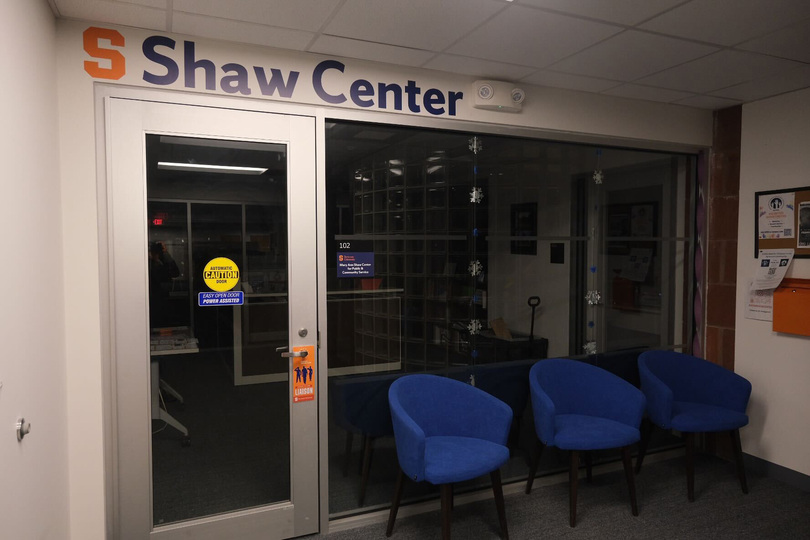Shaw Center Literary Corps receives grant to hire more undergraduate tutors

Maxine Brackbill | Photo Editor
The Syracuse University Literacy Corps program connects SU students with the local community, assigning undergraduate tutors to work with elementary, middle and high school students.
Get the latest Syracuse news delivered right to your inbox.
Subscribe to our newsletter here.
Literacy and education have always been important for Syracuse University senior Katie McPeak, who attended school in the Syracuse City School District. Giving back to the community as a student seemed like a “no-brainer” when she started at SU four years ago, which inspired her to become an SU Literacy Corps tutor.
“I’ve benefited (from becoming a tutor) because I have a job that I love and I’m passionate about,” she said. “I go to work excited, and I’m really proud of the work we do as SULC tutors.”
Since September 2021, McPeak has worked as an undergraduate tutor for SULC, a program that connects SU students to the Syracuse community by assigning tutors to the area. SULC tutors primarily work with elementary school students, but also middle and high school students in the SCSD and the greater Syracuse area, according to SU’s website.
The Shaw Center received a $700,000 grant in January from the Mother Cabrini Health Foundation — an organization that provides grants to improve the health and well-being of vulnerable New Yorkers — to hire new undergraduate tutors for the SULC.

Cindy Zhang | Digital Design Director
“This is the largest of the Foundation’s 32 grants to Onondaga County, and we know this program will continue to have a positive impact on students across Syracuse-area schools and improve education and outcomes throughout the region,” MCHF Managing Director of Programs Liza Primeau wrote in a statement to The Daily Orange.
Carla Ramírez, the Shaw Center’s assistant director and the SULC program coordinator, wrote in a statement to the D.O. that the grant will enable SULC to recruit and hire around 100 SU undergraduate students as tutors in the SCSD and other Syracuse area community organizations.
McPeak said the new grant has allowed the Shaw Center to expand. As of February 2024, the center now has 91 tutors, whereas in the past the center has only had about 30 to 40, she said. The tutors spend nearly 30,000 hours every year giving literacy support, according to SU’s website.
“I’m sure this grant will be beneficial for the community because we now have the capacity to hire and train more tutors. Every school we work with seems to really enjoy having the tutors present in the classroom,” she said. “I’m just so happy that we have it.”
Ramírez wrote she is “confident” that the center will “achieve and exceed” SULC’s threshold of 100 tutors next fall.
Before receiving the grant, Ramírez wrote that SULC could only hire SU undergraduate students with a federal work-study — a federally funded program in the United States that helps students pay for college — which is now no longer a restriction.
With the grant, SULC can now assign tutors to new community organizations the center has wanted to partner with, but never could due to a lack of tutors, Ramírez wrote.
“The more SULC tutors we have, the more school-age youth we can impact in our community. To put it into perspective, last semester we had 17 SULC community partners, this semester we have 22 community partners,” she said.
The grant would also support the tutoring program in hiring 100 new community engagement service positions, MCHF wrote in the statement.
Ramírez wrote that the SULC program hopes to “impact” as many school-age youth as possible. She said their goal is to help “enhance literacy skills” and close the achievement gap for 1,000 community students in classrooms and after-school programs.
The Shaw Center is “always looking” to expand, especially by identifying what to improve to adhere best to community needs and goals, she said.
“Being on the lookout for other grants and having access to external funding is something we will work more intentionally moving on,” she said. “As for the research piece, we want to work more intentionally with our partners on and off campus and develop a more accurate data gathering and analysis method of our impact in the community.”
While the SULC wants to create a “large, robust” program, the center also wants it to be effective, Ramírez wrote. She said SULC is a “reciprocal partnership,” meaning they have to be conscious of taking into account the needs and objectives of the organizations they partner with.
“Now that our program has grown, it is important to maintain open communication and collaboration with our partners to ensure our SULC tutors are an aid and not a burden to our community,” Ramírez wrote. “Our goal is maintaining healthy relationships with our partners based on quality and not quantity.”
McPeak said her time as a tutor has been positive, adding that there’s never a day she doesn’t look forward to her shift as a tutor.
“I’m honestly sad that, because I am a senior, this chapter of being a tutor is coming to an end for me,” McPeak said. “I loved having this experience as an undergraduate.”





